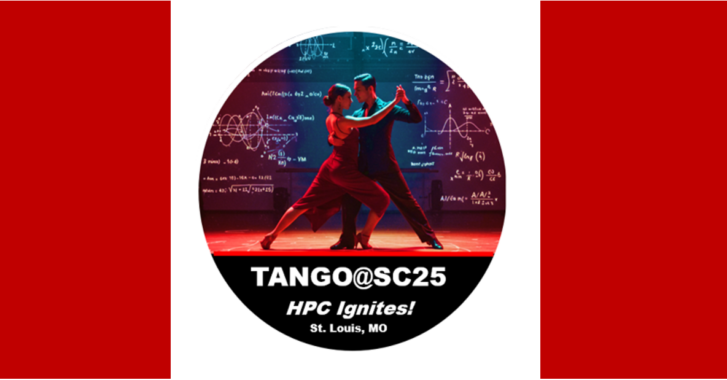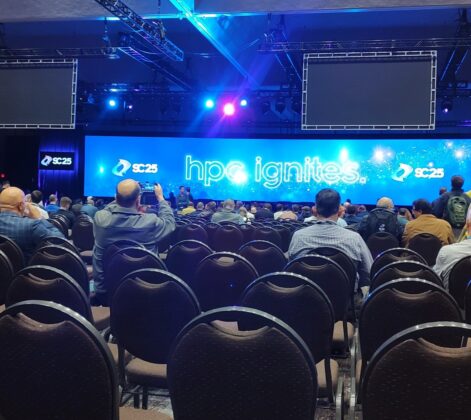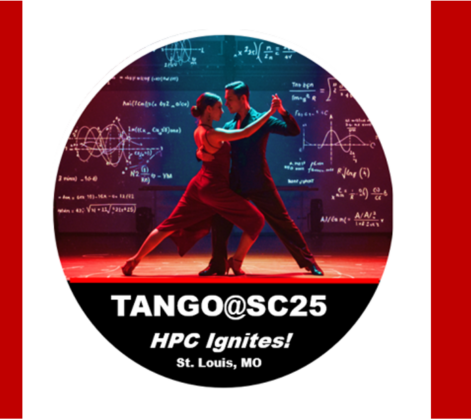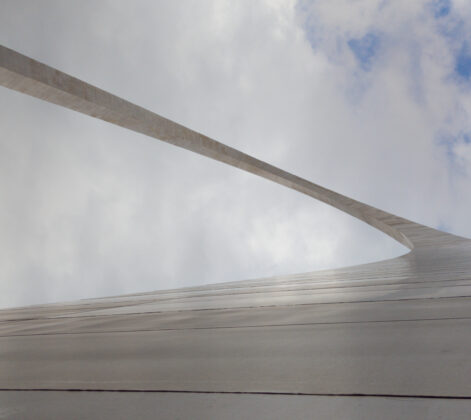STEM-Trek Nonprofit, in collaboration with Texas A&M University and the Conference on Next-Generation Arithmetic (CoNGA), will host the TANGO workshop ahead of the Supercomputing Conference, SC25, in St. Louis, Missouri.
TANGO is a celebration of nonTraditional Architecture and Next-Gen Computational Orchestration. No dancing shoes are required to learn how Compute eXpress Link (CXL), RISC-V and Next-Gen Math are driving a revolution toward more energy-efficient supercomputers. TANGO will convene at the America’s Center on November 15 ahead of SC25, which will be in the same location November 16–22. A jetlag day for TANGO international delegates will be held on Friday, November 14. There is no cost to attend the workshop, but you must apply by August 31. Notifications will be sent by September 15.
We are no longer accepting applications. The final schedule will be shared with registered/accepted participants. If you wish to attend and have not registered, please contact Elizabeth Leake.
More about TANGO@SC25
TANGO@SC25 is the seventh in a series of SC co-located workshops that STEM-Trek has hosted since 2015. The previous six were supported by the U.S. National Science Foundation (NSF; supplements to existing grants, or individual awards), and donations to STEM-Trek. The first, in collaboration with Executive Director Dan Stanzione at the Texas Advanced Computing Center (TACC), was for systems administrators and research facilitators. The second: “HPC On Common Ground@SC16,” in collaboration with the University of Oklahoma and Oklahoma State University, focused on food security science. URISC@SC17 provided cybersecurity training and was co-facilitated by Indiana University and the NSF Trusted-CI program. Funding lapsed in 2018–19, and activities were less communal at SC20–21 due to COVID (ScienceSlams were held online). In 2022, we held the first in-person workshop in five years titled, EarthSci@SC22. NRG@SC23 was a convening to discuss energy-related challenges in resource-constrained environments. ART@SC24, in coordination with Texas A&M University, home of the novel National Science Foundation (NSF)-funded ACES (Accelerating Computing for Emerging Sciences) composable testbed, had an artificial intelligence theme and drew our largest cohort to date (43). ART@SC24 explored the benefits and pitfalls of AI, and complexities associated with AI/ML workflows. Participant blogs from past events are available on the STEM-Trek website.
Travel grants and registration waivers are available for a limited number of participants. The SC25 General Chair has donated 18 full tech program registration waivers (with workshops and tutorials), a room for our meetings, and audiovisual support. Through Texas A&M University High Performance Research Computing (HPRC), we will seek a U.S. National Science Foundation (NSF) grant to cover participant costs for U.S. delegates. STEM-Trek will support 8–10 international delegates, cover our affinity garment (jackets) and some meals. Donations to STEM-Trek will bridge gaps. In the past, this workshop has received funding or in-kind support from a variety of donors.
A call for papers was released by CoNGA in May.
All are welcome to apply for the TANGO@SC25 workshop, but the content will be most beneficial for applicants from NSF EPSCoR states and territories and Southern African Development Community (SADC) members of the African HPC Ecosystems project led by the South African Centre for HPC. All who are involved with or curious about next-generation arithmetic, CXL and RISC-V innovation are also welcome to apply. Participants are required to sign an indemnification form releasing STEM-Trek, its advisers and sponsors from liability (COVID or other). International delegates must purchase travel insurance for medical coverage while they’re in the U.S.
Brief context: We are hitting the energy wall with power-hungry acceleration.
As research workflows become more data-intensive and complex, there is a need for greater acceleration (NVIDIA GPUs being the popular choice). Federated GPU-heavy systems are fully-subscribed, and the community is demanding more. This practice is costly in terms of energy and hardware. However, innovation that employs next-generation arithmetic, CXL and RISC-V technologies can produce greater precision with fewer bits, therefore tackling both energy and storage challenges for AI/ML workflows, while paving the way for quantum computing which will invariably rely on next-gen math and alternate standards.
TANGO will acquaint participants with basic steps – knowledge that can be put to good use when they return home. All will enjoy meeting others who work in similar roles. Having coalesced over two days, the TANGO cohort will feel more comfortable jumping into the deep end of the conference that draws 18,000+ from around the world.
Jetlag Day – time to adjust to the new time zone and altitude. In 2024 the international delegation attended a jetlag day at Georgia Tech. They enjoyed presentations that showcased the resources and services hosted there, and more. The 2023 jetlag day was held at the National Center for Atmospheric Research (NCAR) in Boulder, Colorado (photo above). This year’s jetlag day will be open to all who wish to learn more about the NGA, GIS technology and St. Louis, in general.
Planning committee
Elizabeth Leake, Director, (Texas A&M University; Founder and Director, STEM-Trek Nonprofit; Texas A&M HPRC Project Manager of Advanced CI IV)
Bryan Johnston, Senior HPC Systems Technologist II, (CHPC South Africa)
John Poole, Center for Human Genetics, Clemson University
Kurt Keville, SemiconDX/Somerville Dynamics
Agenda:
1. Jet Lag Day (agenda will be released to accepted participants only): On November 14, we will visit a number of GIS-related labs located downtown within walking distance of the convention center. The labs represent the public face of geospatial innovation surrounding the nearby National Geospatial Intelligence Agency. We are working with Community Host Simon Bailey (CEO, T-Kartor and board member – St. Louis Science Center). St. Louis Area Community of Interest – USGIF
2. Saturday workshop: CoNGA in the morning, and CXL/RISC-V in the afternoon.
CoNGA Welcome, John Gustafson (Arizona State University)
John Gustafson is an American computer scientist and businessman chiefly known as the father of Gustafson’s law. He currently serves as the Chief Technology Officer (CTO) at Ceranovo, Inc. Prior roles include Chief Graphics Product Architect and Senior Fellow at AMD, Solutions Architect at Intel Labs-SC, CEO of Massively Parallel Technologies, Inc. and CTO at ClearSpeed Technology. Gustafson holds applied mathematics degrees from the California Institute of Technology and Iowa State University.
Keynote, Jeffrey Sarnoff (Editor in Chief, IEEE P3109 Standard)
With more than 40 years of experience at the forefront of computer science, software engineering and digital innovation, Jeffrey Sarnoff is well qualified to lead the P3109 Standard for Machine Learning Arithmetic. He pioneered early 3D graphics in the 1980’s and currently leads IEEE high-impact initiatives in numerical computing and software standards. Early in his career, he taught one of the first college-level courses that bridged art and computing at the Rhode Island School of Design. More recently, he has been recognized for exceptional contributions to IEEE technical standards, open-source communities, and industry-leading organizations. Sarnoff combines deep technical expertise in floating-point arithmetic, computer graphics and high-performance computing with proven leadership in cross-functional teams and industry consortia. As an open-source evangelist, he has authored numerous Julia programming language packages, including: DoubleFloats.jl (extended precision arithmetic), NamedTupleTools.jl, Saferintegers.jl, RollingFunctions.jl, ArbNumerics.jl and more. Sarnoff holds an MBA from Cornell University, attended Stanford University as an undergraduate and graduated from Bennington College with majors in Computer Science and Psychology.
- Authors of the four (or more) best CoNGA papers will be invited to present. A call for participation was launched in May.
- Lunch (sponsored by Micron).
- In the afternoon, we will hear a series of talks on CXL and RISC-V innovation. Those who presented at the PEARC24 CXL Meetup will be invited to present.
- Georgia Tech Rogues Gallery overview by Aaron Jezghani.
- A two-hour hands-on Julia training session will be led by Jeffrey Sarnoff, with Texas A&M HPRC trainers Wesley Brashear and TAMU Faculty Member Jian Tao.
Julia is a high-level, high-performance programming language designed for technical computing, especially in areas like scientific computing, machine learning, and data analysis. It aims to combine the ease of use of Python with the speed of languages like C and Fortran. Julia is dynamically typed and supports interactive use, making it suitable for both prototyping and deploying complex applications.
Evening dinner – Sponsored by AMD.
Dinner will be held at “Sauce on the Side,” which specializes in Calzones and other Italian fare.
Thank you, Sponsors:
The SC25 General Chair Lori Diachin (Principal Deputy Associate Director, Computing Directorate at Lawrence Livermore National Laboratory) donated 18 full tech program registrations including workshops and tutorials. These will be to applicants who most need them. We were awarded a grant from the US NSF (23-1 Program for Education and Workforce Development) and recovered funds that weren’t used last year. Additionally, Micron, AMD and other donations to STEM-Trek will support international participant costs, our affinity garment (black with red trim and the TANGO graphic), and group meals.
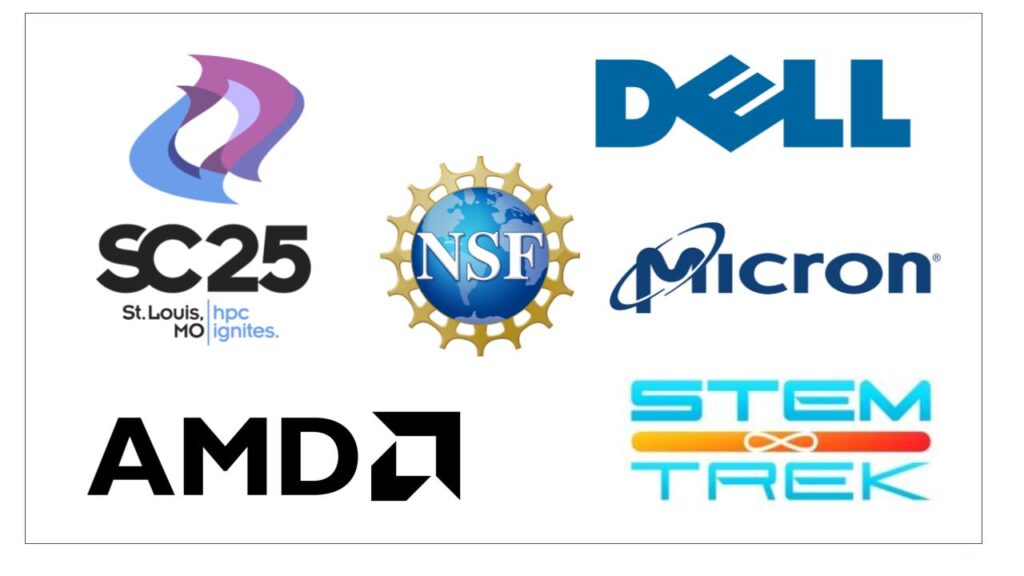
Forty-three attended the ART@SC24 event in Atlanta, Georgia.
Thirty-five attended the NRG@SC23 workshop in Denver, Colorado.
While several were self- or institutionally-supported, most were funded, fully or in part, by the US NSF (US delegates), South African Council for Scientific and Industrial Research (South African delegates), STEM-Trek and the SC Conference General Chairs.

